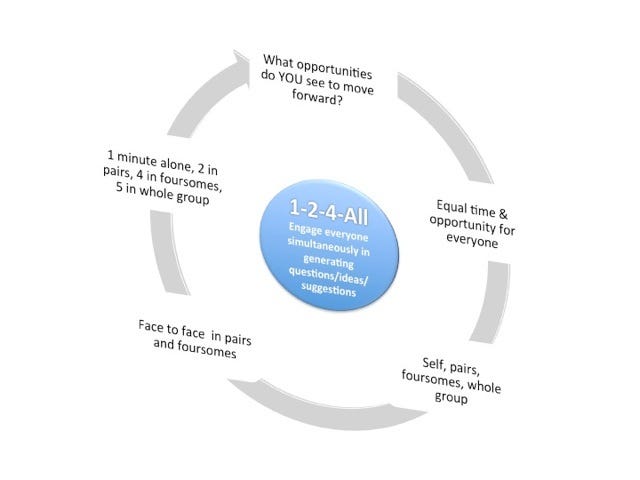✨ Thank you for joining the community craft conga line that is GROUP HUG. So glad you are here. ✨
We gather to think because we’re better together. Because we get stuck alone! Because we are far less electric and funny and expansive when it’s just us hashing out an idea on paper by ourselves, with just our own life experiences and hot takes informing our limited perspectives.
It’s wild, then, how many rooms I’ve been in with a group of people gathered there for specific reasons who never speak at all.
Maybe you’ve felt it too. A few loud voices dominate the space. Brainstorms begun with gusto but stumble in their open-endedness. A long presentation and radio silence afterwards, the only prompt “Any questions?”
Any way you slice it, the loss is the same: a bunch of interesting and cool people were brought together and didn’t all get to add their magic to the pot.
“We know that the group is smarter than any single individual,” Henri Lipmanowicz and Keith McCandless write in The Surprising Power of Liberating Structures. “The challenges are: How to tap into a group’s collective intelligence and creativity when discussing an issue?”
The answer, as so many are in this book, is deceptively simple: let people reflect by themselves, share their thoughts with another person, and synthesize in a bigger group who can share back to the rest of the room.
The activity is called 1-2-4-All and goes something like this:
Silent self-reflection by individuals on a shared challenge, framed as a question (e.g., What opportunities do YOU see for making progress on this challenge? How would you handle this situation? What ideas or actions do you recommend?) 1 min.
Generate ideas in pairs, building on ideas from self-reflection. 2 min.
Share and develop ideas from your pair in foursomes (notice similarities and differences). 4 min.
Ask, “What is one idea that stood out in your conversation?” Each group shares one important idea with all (repeat cycle as needed). 5 min.
It’s one of those exercises that is so wildly easy that at first you might be like “duh” and then “why don’t I Google a far cooler, more creative facilitative exercise” and then, finally, when designing the agenda for another stressful group gathering, you see it: you’ve been facilitating all wrong for your whole facilitator life. You’re one of the alleged spacemakers who doesn’t actually give everyone a chance to speak. You’ve spent so much energy coming up with the perfect presentation, puzzling over group dynamics, pep talking yourself for when your question to the group is met with silence. Energy that you could have given back to the group to tap into their collective wisdom together.
Or at least that’s how I felt.
There was a time when I was putting massive amounts of energy into facilitating a group of people to come to consensus around governance models of a space. Every meeting began the same. My co-facilitator and I would sum up where we landed last time and essentially posed an open question back to the group. One person after another would raise their hand to get in the queue, speak anywhere for two to ten minutes, and then the same people would keep raising their hand, responding to responses, tension spiking in everyone’s shoulders, me opening and closing my mouth like a weird little fish, trying to insert myself to sum up what had been said so far.
I started to get physically nauseous before these meetings. The vibe was out of control gnarly and it felt like my fault.
Around that time, I read in Liberating Structures that this sort of format is called Managed Discussion, which “puts into the hands of one person the control for including/engaging a small number of participants.”
As far as people power goes, Managed Discussion is on one far end of the spectrum (Centralized Control) compared to 1-2-4-All (Distributed Control).
Seeing this felt like relief. I thought that what I was doing was distributed. I thought my suffering was in service of the group. That our tension and stress was the byproduct of collective decisionmaking. But really, this microstructure was both harder for me and harder for the group. It silenced voices, usually those who didn’t identify as cis white men. It favored fast, verbal processing over quiet reflection. It put one or two people on a stage instead of giving people the opportunity to build relationships with each other and work through divergent opinions in smaller groups.
It placed the fallout on me to deal with.
“1-2-4-All levels the personality playing field, giving safe spaces for the more timid and preventing the more vocal ones from monopolizing the entire discussion. Many more good ideas are given the chance to get picked up. Without having to jostle for space to be heard, participants are free to focus on listening. Cocreation rather than advocating for one’s position becomes more possible. As all participants discover the same information at the same time, they can discover patterns together. Better ideas, and more of them, are generated.”
Plus, the whole thing takes 15 minutes. What’s better than that?
Why don’t you share this with someone you want to distribute control with? Imagine writing that in your intro to them, lol. If you do, please tell me about it.






